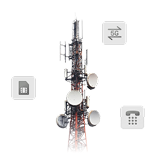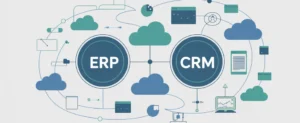
Seamless business operations require more than just efficient workflows—they demand interconnected systems that work in harmony. Enterprise Resource Planning (ERP) and Customer Relationship Management (CRM) platforms are two of the most critical business applications. While ERP focuses on streamlining operations, financials, and supply chain management, CRM is designed to enhance customer interactions, sales, and service.
When these systems operate in isolation, businesses suffer from inefficiencies, data discrepancies, and missed growth opportunities. The solution? Seamless ERP-CRM integration. By connecting these systems, enterprises can improve decision-making, automate workflows, and deliver exceptional customer experiences.
In this blog, we will explore why ERP-CRM integration is a strategic necessity, real-world use cases, key challenges, and the best approach to achieving a connected business ecosystem.
Why ERP-CRM Integration is Essential for Modern Enterprises?
Organizations that fail to integrate ERP and CRM often encounter data silos, manual inefficiencies, and a fragmented view of customers. Here’s why integrating these systems is no longer an option but a necessity:
- Unified Data for Smarter Decisions – Sales, finance, and operations teams gain access to real-time, synchronized data, ensuring informed decision-making and strategic planning.
- Operational Efficiency & Automation – Eliminates redundant data entry, reducing errors and improving productivity across departments.
- Enhanced Customer Experience – Provides a 360-degree customer view, enabling personalized interactions, quick issue resolution, and improved service levels.
- Increased Sales & Revenue – Sales teams can access accurate product availability, pricing, and customer history, leading to faster deal closures and better revenue forecasting.
- Seamless Order-to-Cash Process – Ensures smooth transitions from lead generation to order fulfilment, invoicing, and revenue recognition.
How Leading Enterprises Leverage ERP-CRM Integration
In the digital-first economy, businesses that successfully integrate ERP and CRM systems unlock new efficiencies and competitive advantages. Here are real-world examples of how industries benefit:
- Financial Services: Banks and financial institutions align customer interactions with transaction history, improving customer engagement and regulatory compliance.
- Retail & E-commerce: Businesses synchronize sales data with inventory management, ensuring accurate stock updates, seamless logistics, and personalized marketing campaigns.
- Manufacturing: Companies integrate sales forecasting with production planning, optimizing supply chain efficiency and reducing downtime.
- Healthcare: Integration bridges the gap between patient records, billing, and inventory, enabling streamlined patient care and operational efficiency.
Most Common Use Cases of ERP-CRM Integration
- Automated Quote-to-Cash Workflow – Sales teams generate quotes in the CRM, automatically syncing with ERP for invoicing and payment tracking.
- Real-Time Inventory & Pricing Updates – Sales representatives access up-to-date inventory data to avoid stockout issues and pricing errors.
- Financial & Sales Forecasting – By linking CRM sales data with ERP financial models, businesses can make accurate revenue predictions.
- Customer Support Optimization – Service teams gain instant access to order history, warranties, and billing details, ensuring faster issue resolution.
- Data-Driven Marketing Campaigns – Integrated data enables hyper-personalized marketing efforts based on customer purchase behavior and preferences.
Challenges in ERP-CRM Integration & How to Overcome Them
Despite its advantages, integrating ERP and CRM systems can present several hurdles. Here’s what businesses need to address:
- Data Inconsistencies: ERP and CRM systems often use different data structures, leading to synchronization issues. A structured data mapping strategy ensures accuracy.
- Customization Complexities: Legacy ERP systems may require extensive modifications to align with modern integration needs. A scalable integration framework simplifies the process.
- Security & Compliance Risks: Integration increases exposure to cybersecurity threats. Implementing robust encryption, access controls, and compliance frameworks mitigates risks.
- Scalability Concerns: Many businesses struggle with integrations that fail to adapt to growth. A flexible, cloud-enabled approach ensures scalability and future readiness.
- High Implementation Costs: Traditional integration methods can be expensive and time-consuming. A strategic, phased approach reduces costs while accelerating value realization.
A Strategic Approach to Seamless ERP-CRM Integration
To maximize the benefits of integration, businesses must adopt a structured approach:
- Assess Business Needs: Identify the core objectives, pain points, and expected outcomes of integration.
- Standardize Data Structures: Establish a common data framework to ensure seamless synchronization.
- Automate Workflows: Define process automation strategies to eliminate manual inefficiencies.
- Prioritize Security & Compliance: Implement security best practices to protect sensitive business and customer data.
- Ensure Continuous Monitoring & Optimization: Regularly track integration performance and refine processes for long-term efficiency.
ERP-CRM integration is more than just a technical upgrade—it’s a strategic enabler of business transformation. By breaking down silos, streamlining operations, and enhancing customer engagement, enterprises can unlock new levels of efficiency and profitability.
Is your business ready to embrace seamless connectivity? A well-executed integration strategy can help you harness the full potential of your ERP and CRM systems, driving sustainable growth and competitive advantage. Talk to our integration experts today to explore how ERP-CRM integration can revolutionize your operations.
Shyam Sundar
Technical Architect
Shyam Sundar is a Technical Architect at Tellestia, with a deep passion for building scalable and future-ready tech solutions. He shares insights on architecture, engineering best practices, and emerging technologies.
API Integration
Application Integration
CRM Integration
Data Integration
Enterprise Integration
ERP Integration

























